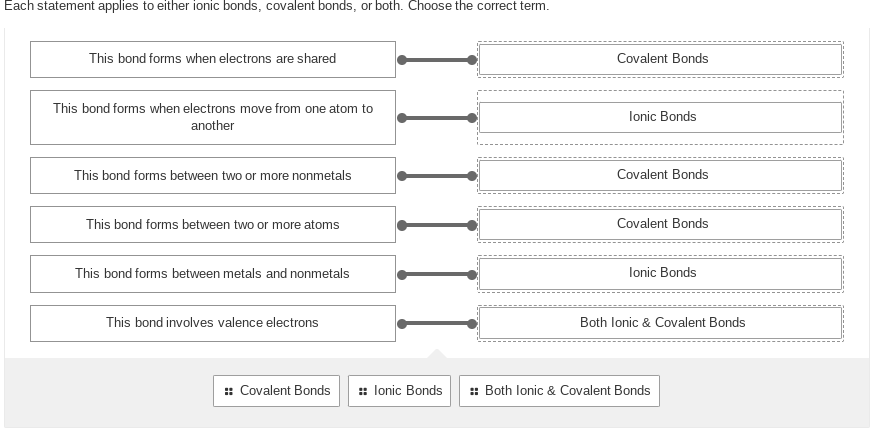Each statement applies to either ionic bonds, covalent bonds, or both. Choose the correct term. This bond forms when electrons are shared This bond forms when electrons move from one atom to another This bond forms between two or more nonmetals This bond forms between two or more atoms This bond forms between metals and nonmetals This bond involves valence electrons :: Covalent Bonds ]]]]] :: lonic Bonds Covalent Bonds Ionic Bonds Covalent Bonds Covalent Bonds Ionic Bonds Both lonic & Covalent Bonds :: Both lonic & Covalent Bonds
Each statement applies to either ionic bonds, covalent bonds, or both. Choose the correct term. This bond forms when electrons are shared This bond forms when electrons move from one atom to another This bond forms between two or more nonmetals This bond forms between two or more atoms This bond forms between metals and nonmetals This bond involves valence electrons :: Covalent Bonds ]]]]] :: lonic Bonds Covalent Bonds Ionic Bonds Covalent Bonds Covalent Bonds Ionic Bonds Both lonic & Covalent Bonds :: Both lonic & Covalent Bonds
ChapterU2: Smells: Molecular Structure And Properties
Section: Chapter Questions
Problem 3STP
Related questions
Question
1. Each statement applies to either ionic bonds, covalent bonds, or both. Choose the correct term.
2. Select all the statements that are generally true about ionic compounds

Transcribed Image Text:Each statement applies to either ionic bonds, covalent bonds, or both. Choose the correct term.
This bond forms when electrons are shared
This bond forms when electrons move from one atom to
another
This bond forms between two or more nonmetals
This bond forms between two or more atoms
This bond forms between metals and nonmetals
This bond involves valence electrons
:: Covalent Bonds
IIII
::lonic Bonds
Covalent Bonds
Ionic Bonds
Covalent Bonds
Covalent Bonds
Ionic Bonds
Both lonic & Covalent Bonds
:: Both lonic & Covalent Bonds

Transcribed Image Text:Select all the statements that are generally true about ionic compounds
✔ They tend to have crystaline structures
They tend to be electrically conductive
O They have low melting and boiling points
The are often soluble in water
They are often liquids or gases at room temperature
Expert Solution
This question has been solved!
Explore an expertly crafted, step-by-step solution for a thorough understanding of key concepts.
Step by step
Solved in 4 steps

Knowledge Booster
Learn more about
Need a deep-dive on the concept behind this application? Look no further. Learn more about this topic, chemistry and related others by exploring similar questions and additional content below.Recommended textbooks for you


Introductory Chemistry: A Foundation
Chemistry
ISBN:
9781337399425
Author:
Steven S. Zumdahl, Donald J. DeCoste
Publisher:
Cengage Learning

Chemistry: An Atoms First Approach
Chemistry
ISBN:
9781305079243
Author:
Steven S. Zumdahl, Susan A. Zumdahl
Publisher:
Cengage Learning


Introductory Chemistry: A Foundation
Chemistry
ISBN:
9781337399425
Author:
Steven S. Zumdahl, Donald J. DeCoste
Publisher:
Cengage Learning

Chemistry: An Atoms First Approach
Chemistry
ISBN:
9781305079243
Author:
Steven S. Zumdahl, Susan A. Zumdahl
Publisher:
Cengage Learning


Chemistry
Chemistry
ISBN:
9781305957404
Author:
Steven S. Zumdahl, Susan A. Zumdahl, Donald J. DeCoste
Publisher:
Cengage Learning
